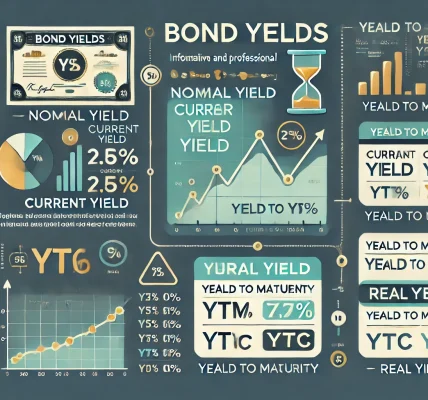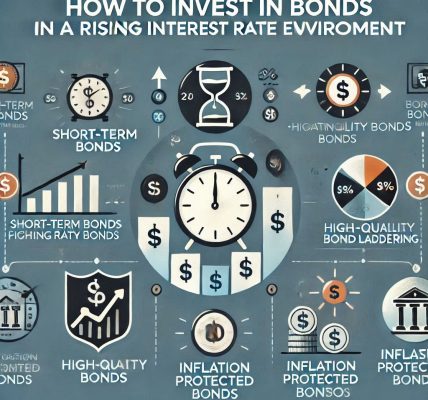Introduction: In times of economic uncertainty, investors often seek safer investment options to protect their capital while still earning a return. One such option is corporate bonds. These debt securities issued by companies can provide a stable source of income and potential for capital preservation, making them an appealing choice when market volatility and economic instability are on the rise. In this blog, we’ll explore why corporate bonds are considered a safe investment during turbulent times and how they can play a key role in a diversified portfolio.
What Are Corporate Bonds? Corporate bonds are debt instruments issued by companies to raise capital for various purposes, such as funding expansion, research and development, or paying down debt. When you purchase a corporate bond, you are essentially lending money to the issuing company in exchange for regular interest payments (coupons) over the bond’s term. At maturity, the principal amount is repaid to you.
Unlike government bonds, which are backed by the credit of the national government, corporate bonds are backed by the issuing company’s creditworthiness. They come in a range of risk profiles, with higher-rated bonds being safer and offering lower yields, while lower-rated bonds offer higher yields but come with greater risk.
Why Are Corporate Bonds Safe Investments During Economic Uncertainty?
- Fixed Income and Regular Payments: One of the main reasons corporate bonds are considered a safe investment during uncertain times is their ability to provide fixed income. Bondholders receive regular interest payments, typically semi-annually, which can offer a reliable stream of income even when the economy is struggling. This predictable income stream can be especially appealing when other forms of investment, like stocks, are volatile.
- Less Volatile Than Stocks: Corporate bonds are generally less volatile than stocks, making them a safer alternative during periods of market instability. While stock prices can swing dramatically due to economic events, corporate bonds tend to experience smaller fluctuations in value. This stability can help mitigate risks in your portfolio and protect your investments from significant losses.
- Higher Credit Quality of Blue-Chip Companies: When investing in corporate bonds, it’s important to consider the credit quality of the issuing company. Investment-grade corporate bonds, issued by large, financially stable companies (often referred to as blue-chip companies), are considered safer investments. These companies have strong balance sheets, reliable cash flows, and a long track record of meeting their debt obligations. Investing in high-quality corporate bonds can provide safety during economic uncertainty, as these companies are less likely to default on their bond payments.
- Diversification Within the Corporate Bond Market: Corporate bonds offer the opportunity for diversification across various sectors and industries. By investing in bonds issued by companies in different industries, you can spread the risk of any one sector underperforming due to economic turmoil. Diversification can help reduce the overall risk in your portfolio and protect you from the volatility that often accompanies recessions or economic slowdowns.
- Interest Rate Sensitivity: During periods of economic uncertainty, central banks often lower interest rates in an effort to stimulate economic growth. When interest rates fall, the value of existing bonds tends to rise, as newer bonds offer lower yields. This means that in a low-interest-rate environment, the value of your corporate bonds may increase, providing you with capital appreciation in addition to regular interest income.
- Investment-Grade Bonds and Lower Default Risk: Investment-grade corporate bonds are issued by companies with strong credit ratings, typically rated BBB- or higher by agencies like S&P and Moody’s. These bonds are considered lower risk than high-yield (junk) bonds, as the issuing companies have a lower chance of defaulting on their payments. During economic uncertainty, holding high-quality corporate bonds can provide a safety net, as these companies are more likely to weather financial storms.
- Tax Advantages in Some Cases: Some corporate bonds come with tax advantages, depending on the country’s tax laws. For example, certain corporate bonds may offer tax-exempt status on interest income. This feature can make them even more appealing to investors who are looking for ways to increase their after-tax returns during uncertain economic times.
How to Invest in Corporate Bonds?
- Direct Purchase: One of the simplest ways to invest in corporate bonds is to buy them directly through a brokerage account. This gives you the opportunity to choose specific bonds from companies you trust. Make sure to check the bond’s credit rating, yield, and maturity date before purchasing.
- Bond Funds and ETFs: If you prefer a more diversified approach, you can invest in corporate bond mutual funds or exchange-traded funds (ETFs). These funds pool money from multiple investors and invest in a diversified portfolio of corporate bonds. Bond funds and ETFs can provide exposure to a broad range of bonds, which helps spread risk and lower individual bond default risk.
- Robo-Advisors: Another option is to invest in corporate bonds through robo-advisors. These automated platforms use algorithms to build and manage investment portfolios based on your risk tolerance and financial goals. Many robo-advisors offer bond portfolios that include a mix of government and corporate bonds.
- Consult a Financial Advisor: If you’re unsure about how to incorporate corporate bonds into your portfolio, it’s a good idea to consult a financial advisor. They can help you assess your risk tolerance, investment objectives, and recommend a strategy that includes corporate bonds suited to your needs.
Risks of Corporate Bonds and How to Mitigate Them:
- Credit Risk: The main risk associated with corporate bonds is credit risk, which refers to the possibility that the issuing company may default on its bond payments. This is particularly a concern with bonds issued by companies with lower credit ratings. To mitigate this risk, it’s advisable to invest in investment-grade bonds from financially stable companies.
- Interest Rate Risk: Corporate bonds are also sensitive to changes in interest rates. When interest rates rise, the value of existing bonds falls. To reduce interest rate risk, consider investing in bonds with shorter durations, as they are less sensitive to interest rate changes.
- Liquidity Risk: Some corporate bonds, especially those issued by smaller companies, may be harder to sell quickly without incurring a loss. This can be a concern if you need to sell your bonds in a hurry. To avoid liquidity risk, it’s a good idea to focus on bonds from larger, more established companies or invest in bond funds for more liquidity.
Conclusion:
Corporate bonds can be a safe and reliable investment option during periods of economic uncertainty. They provide fixed income, stability, and diversification, making them an ideal choice for investors seeking to preserve capital while still earning a return. By choosing investment-grade bonds from reputable companies and diversifying your holdings, you can minimize risk and take advantage of the opportunities that corporate bonds offer during turbulent economic times.




